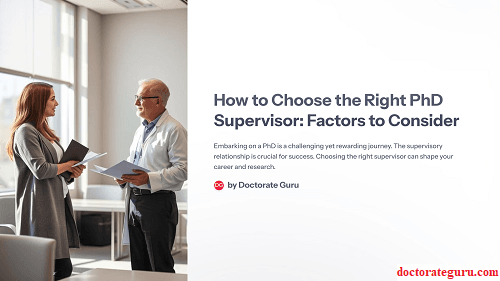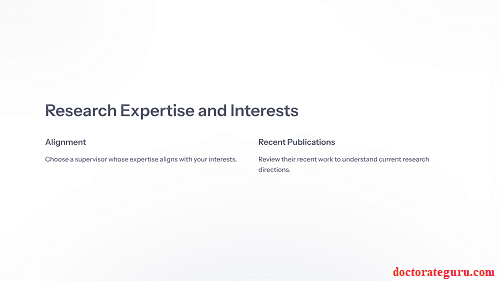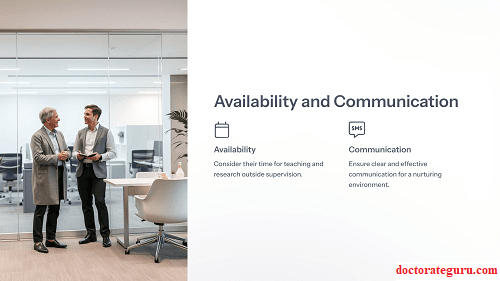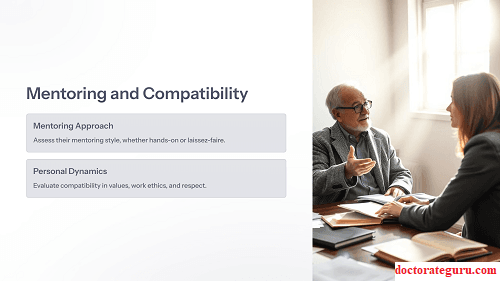The PhD journey is an arduous and rewarding one, full of challenges, opportunities, twists and turns. The PhD experience can shape lifelong intellectual interests, career aspirations, and personal relations. To choose the right PhD supervisor means taking a positive step towards your career. Stepping into a PhD program is like embarking on a long voyage at sea and the supervisory relationship in this journey is as important as navigation equipment and the condition of the boat.
As primary guides in a doctoral student’s research journey, supervisors can shape the student’s career and research in many ways. Hence, choosing the right PhD supervisor can make or break your doctoral journey. A good match between supervisor and student can lead to timely completion, successful research, and overall satisfaction from the students. On the other hand, a poor match may result in long completion times or even dropping out of the PhD program, research stress, confusion, and personal dissatisfaction with the student.
Concurrently, a strong supervisory relationship guides your academic growth, influences your career prospects, facilitates intellectual production, and maintains initiative throughout your doctoral journey. It is, therefore, necessary for students to put much deliberation into choosing who will become their supervisor. Remember, it’s not just about finding a renowned professor, it’s about finding someone whose expertise, mentorship style, and availability align with your research goals.
What are the Roles of a PhD Supervisor?
The role of a PhD supervisor is often widely misunderstood. It is often assumed that a supervisor’s role is simply to direct the research student in how to conduct research. This is far from the truth. A PhD supervisor adopts multiple roles and is involved in guiding a research student in which topic should be researched, the methodologies that should be used, and how the student should present findings, both written and orally.
Apart from researching student problems, supervisors have to be aware of the academic environment. This might include understanding departmental dynamics, current research interests within a particular field of study, and understanding how to network and present research to specific audiences. A PhD supervisor needs to be respected in the wider academic community for the professional development of his/her PhD student. Funding is often tightly connected to the supervisor. A supervisor has to assist in the professional development of his/her PhD student and provide or coordinate resources and networking opportunities.
In a nutshell, below is a summary of the roles of a PhD supervisor, and it is believed that students can reasonably expect their supervisors to:
- Guide them in a customized/tailored way.
- Be available when needed.
- Be open, supportive, reliable, trustworthy, clear in the relationships, and friendly.
- Be constructively critical.
- Have a good knowledge of their research area.
- Structure tutorials so that ideas can be exchanged relatively easily.
- Have sufficient interest in their research.
- Be sufficiently involved in their success to help them get a good job.
It is advised that PhD students sit down and reflect on the qualities, which they would like from their supervisors. It should be added that it is probably unlikely that one particular supervisor has all the desired qualities.
Read Related: Different Types of PhD Supervisors and Their Characteristics
Factors to Consider in Choosing a PhD Supervisor
Choosing the right PhD supervisor is an important decision that can greatly affect a student’s academic path and research success. Therefore, it is essential to carefully assess multiple elements that may influence this decision. The concise guidelines presented below aim to enhance the selection process of prospective supervisors. A candidate who pays careful attention to these criteria is likely to make a good choice, while also recognizing that even the most well-planned arrangements may experience challenges from time to time. Some of the key factors to consider include the supervisor’s research interests, their availability and responsiveness, and their mentoring style.
#1. Research Expertise and Interests
A successful doctoral journey largely hinges on the ability to foster a constructive supervisory relationship. The supervisor’s influence is critical, and choosing the right mentor is a vital step in the PhD process. Aspiring students are often encouraged to seek out leading scholars within their specific fields, as their expertise can significantly enhance the research endeavor and provide valuable connections.
Choosing a PhD supervisor whose research expertise aligns with your interests is crucial for your academic success and overall satisfaction in the program. This alignment not only ensures that you receive guidance that is relevant to your research goals but also fosters a productive and enjoyable working relationship. You must look into your potential supervisors’ recent publications and ongoing projects to understand their current research directions. Having a supervisor whose interests align with yours can offer crucial perspectives on the latest trends and methodologies in your field.
SEE RELATED ⇓
#2. Availability and Accessibility
Having a readily available supervisor will impact your research positively and equally improve your emotional well-being. It makes sense for students to consider how much of a supervisor’s time is available for teaching, research, and service pursuits outside of supervising a dissertation, i.e. attending notable international academic conferences, service on editorial boards of selective academic journals, and management board associations.
Accessibility refers not only to easy physical access but also to the open engagement of the supervisor with students. The availability and accessibility of the PhD supervisor play a crucial role in ensuring effective communication and support throughout your research journey. A readily available supervisor can provide timely feedback, which is essential for maintaining your research momentum. Their accessibility can significantly influence your ability to discuss ideas, troubleshoot problems, and navigate challenges that arise during your studies.
#3. Communication Style
The manner in which a potential PhD supervisor communicates plays a vital role in shaping the overall experience of a doctoral candidate. When communication is clear and effective, it lays the foundation for a nurturing and collaborative atmosphere, empowering students to openly share their ideas and voice any concerns they may have. It is also important to consider whether the supervisor’s way of communicating aligns with your own style, as this can significantly affect the quality of the advice and feedback you receive during your research endeavors.
When a supervisor whose communication style resonates with you, then it is likely to foster a more fruitful mentoring relationship. You should consider whether the supervisor’s preferred mode of communication aligns with yours e.g. do they prefer in-person communication or are they more likely to respond via email? It is also relevant to think about the feedback mechanisms that supervisors use. This alignment leads to a mutual understanding of expectations and contributes to a more encouraging academic environment, which, in turn, cultivates a productive research partnership.
#4. Mentoring Approach
Different supervisors take different approaches to mentoring and their approach has implications for the development of postgraduate students, especially PhD students. The mentoring approach of a PhD supervisor plays a crucial role in shaping the research experience and overall success of a doctoral candidate. Some supervisors take a hands-on approach, advising on almost every aspect of the research, while others will take a more laissez-faire approach only giving guidance when requested.
Supervisors vary greatly in the personal style they employ and this will have a significant impact on the doctoral experience. A supervisor who actively involves their students in research discussions provides constructive feedback, and encourages independent thinking can create an atmosphere that not only promotes academic success but also personal growth. Therefore, it is essential to assess potential supervisors’ mentoring approaches during the selection process. This can significantly impact the overall experience and success of your doctoral journey.
#5. Compatibility and Personal Dynamics
In many ways, the personal dynamic, or compatibility, is the most important yet often overlooked factor when considering a supervisor. Compatibility in this sense refers to the far less glamorous aspects of a working relationship – the values and work ethics, communication preferences, and personal respect. The personal dynamics and overall compatibility between the PhD student and their supervisory team are fundamental to the success of the research and training.
Supervisors are not just guiding the student through the technical aspects of a PhD, but also exerting their own personal interests and serial experience. The supervisory team plays a critical role in establishing professional networks that help nurture the future academic and research career. A strong working relationship can provide crucial mentoring, facilitating early career decisions and progression to independent researchers. When choosing a PhD supervisor, personal dynamics and overall compatibility should be evaluated carefully, as these factors can lead to better outcomes in terms of both research and personal development.
Conclusion
Choosing a supervisor who aligns with your research interests, provides adequate support, and fosters a positive working relationship can pave the way for a fruitful PhD experience. It is essential to conduct thorough research on potential supervisors, considering their expertise, availability, and mentorship style. Making a well-informed decision will not only enhance your academic performance but also contribute to your personal growth as a researcher. Remember, the right supervisor will align with your research interests and help you navigate the challenges of your PhD journey.









